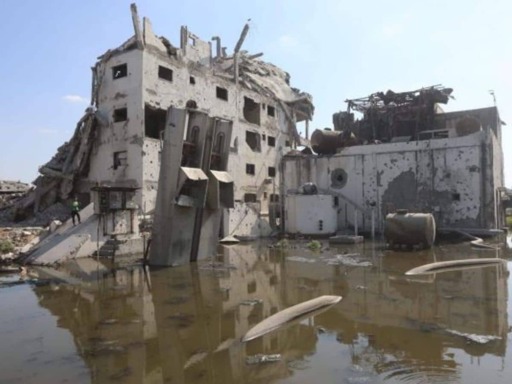The Gaza government’s emergency operations unit has issued an urgent appeal to the United Nations, its agencies, and international humanitarian organisations. It’s calling for immediate action to protect thousands of displaced families facing the threat of flooding as winter approaches.
Displaced families face imminent threat of flooding and need to be relocated
Dr. Samah Hammad, head of the operations unit, described the situation as “extremely dire.” She said families living in coastal and low-lying areas face an immediate threat from flooding, rainwater, and storm surges. Hammad urged the relocation of families to safe shelters and called for urgent delivery of aid.
The ongoing genocide has destroyed infrastructure across Gaza — including drainage systems and roads. Gaza Municipality reports that most wastewater plants, pumping stations, and sewage networks are in ruins. This extensive destruction has led to a build-up of contaminated water, environmental toxicity, and serious public-health risks.
Collapsed water and sanitation systems make neighbourhoods more prone to flooding and prevent communities from coping with heavy rains. Living conditions are worsening fast — many displaced people have no protection from the cold and no heating at all.

Items needed for winter survival are prevented from entering Gaza by the Israeli occupation
Gaza’s humanitarian crisis has deepened under years of blockade and repeated Israeli assaults. Even before October 2023, 80% the population relied on aid to survive. Israel continues to ban construction materials, blocking any real reconstruction effort. Now the siege is stopping tents, building materials, and winter supplies from entering — even as storms approach.
Hammad said international organisations already have shelter supplies ready, but Israel has refused to grant border access. Aid entry remains severely restricted — in clear breach of the ceasefire agreement promising 600 trucks per day.
According to Gaza’s Government Media Office, between 10 October and 31 October 2025 only 3,203 aid trucks entered Gaza — an average of just 145 a day. That’s nowhere near enough to meet urgent needs.
Humanitarian aid needs to be immediate and unrestricted
The Ministry of Public Works and Housing has identified almost 300 temporary shelter sites equipped with basic water and sanitation facilities near displaced communities. But these safe zones can only function if international and local authorities coordinate — and if Israel stops blocking access.
Humanitarian groups like the International Committee of the Red Cross (ICRC) and the UN Refugee Agency (UNHCR) are mobilising to help but need unrestricted entry to do their work.
Hammad urged the international community to demand the immediate, unhindered delivery of tents, shelter materials, and prefabricated housing units. Without this, hundreds of thousands of people face another winter without safety or dignity.
Featured image via the Canary
By Charlie Jaay
From Canary via this RSS feed


